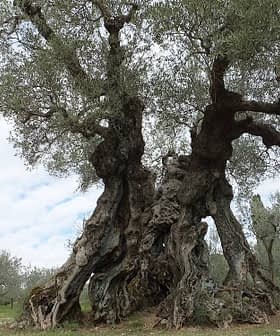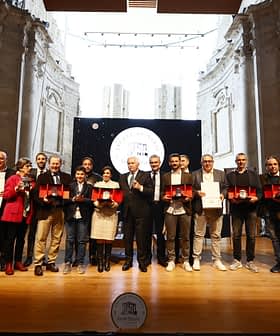Leonardo Laureti is the president of the Consortium of PDO Umbria extra virgin olive oils, which aims to support the PDO, inform consumers and encourage new initiatives to promote Umbrian brands on the market.
We estimate that the 2014 production is about 5 percent of 2013’s
Recently, Laureti made statements about the failure of the Italian and Umbrian olive sectors to be better prepared for the challenges — environmental and otherwise — that have resulted in one of the worst years in recent history for Italian olive oil; so bad, in fact, that Tunisia has replaced Italy as the world’s second largest olive oil producer.
We checked in on Laureti this week to see how his growers are doing after the “annus horribilis.”
Q: Mr. Laureti, in November you blamed the olive growers in Umbria because, in your opinion, they had not been able to prevent the problems of the disastrous season. What was the final balance for PDO Umbrian oil?
That was not a reprimand, but an invitation to a greater awareness that the olive growing can’t be left to fate, and that, facing a bad crop like in 2014 (the worst one in our long history), the simple complaints represent the most useless and wrong solution that can be found.
As I have already repeated last spring, because of the moisture that prevented the pollination of olives and, after an year with a great harvest like 2013, a season with a low production of PDO Umbria oil was expected, so we started with low outlooks for 2014.
See Also:Complete Coverage of the 2014 Olive Harvest
At the moment, we estimate that the 2014 production is about 5 percent of 2013’s. From an economic point of view this is a dramatic situation for the oil sector, but on the other hand, we can state that the monitoring institutions have worked well by controlling the supply chain to safeguard consumers and the producers themselves from counterfeiting.
Another interesting thing is the growing awareness of all of us about the importance of the oil we use in our cuisine. Consumers are willing to pay a little more to buy the PDO Umbria oil and probably its price will continue to have this (high) level for a while.
You called for a wider vision and more professionalism from olive growers: what are the tools your association implemented to improve the yield and production for next season?
For our Consortium it was necessary to give a strong message for a continuous improvement of the production system. The so called “olive fly” adversity has been known for a long time; weather in 2014, however, made its control very complex and difficult, because the high temperatures in winter and the lower ones in summer, with the presence of continuous rains, have favored the development of plant diseases.
For that reason, our Consortium prepared a guide for fighting the olive fly in collaboration with the Plant Protection Service of the Umbria Region. The handbook offers tips to prevent attacks of the fly, defines the technical monitoring of this insect and lists the fighting techniques in both organic and conventional farming, in accordance with the best agricultural practices. Finally, I recommend to turn to a professional agronomist.
This year, the demand for PDO oil exceeded supply: this is definitely a good sign for the many small producers who are crushed by the international players, but it is also a signal showing us how our product is popular in the world, considered almost essential, and that makes us proud of the work we’ve done in recent years.
Is it possible to make forecasts for PDO Umbria oil production in 2015?
According to the best scenario, we envisage two years of interesting harvests, since the world provisions are running out and then it will be necessary to start from scratch. 2014 was a year of “discharge” which is typical in the cycle of olive growing. All harvests in agriculture depend on nature, being continuously exposed to weather events and diseases.
Fortunately Umbria has a territory that gives us extraordinary products, primarily oil, characterized by high organoleptic and healthy contents; our producers have to live up to what our territory offers them, in order to sell the excellence to our consumers. We are small, but our oil represents excellence on the global market.
2015 is the year of the Expo, focusing on “Feeding the Planet.” Will the Consortium be present at the universal exhibition?
Of course, we will be there, because it is a unique opportunity, and because we have a moral obligation in front of a claim that says “Feeding the world, energy for life.” We do not hide our disappointment due to the lack of an “oil pavilion,” as they have organized for wine.
We will be able to tell about the wonderful Mediterranean culture where the olive tree plays a symbolic role. We will bring with us our heritage, producers, millers, olive-growing landscape; that is to say our identity. We prepared two projects: one for communication and one about the link between design and food. We like to think that beauty, goodness and knowledge are a privilege we have to support.
What are the objectives of your participation?
Promoting and spreading Umbrian culture and learning from our friends in the world, to exchange ideas and good agricultural practices: why not? Actually, the Expo is also an opportunity to compare ourselves, to be intrigued, to propose development models in harmony with our land. We are dwarfs on the shoulders of a giant and we have the task of showing our “beauty” as it was perceived by the ancient Greeks: harmony between beauty and fairness.





